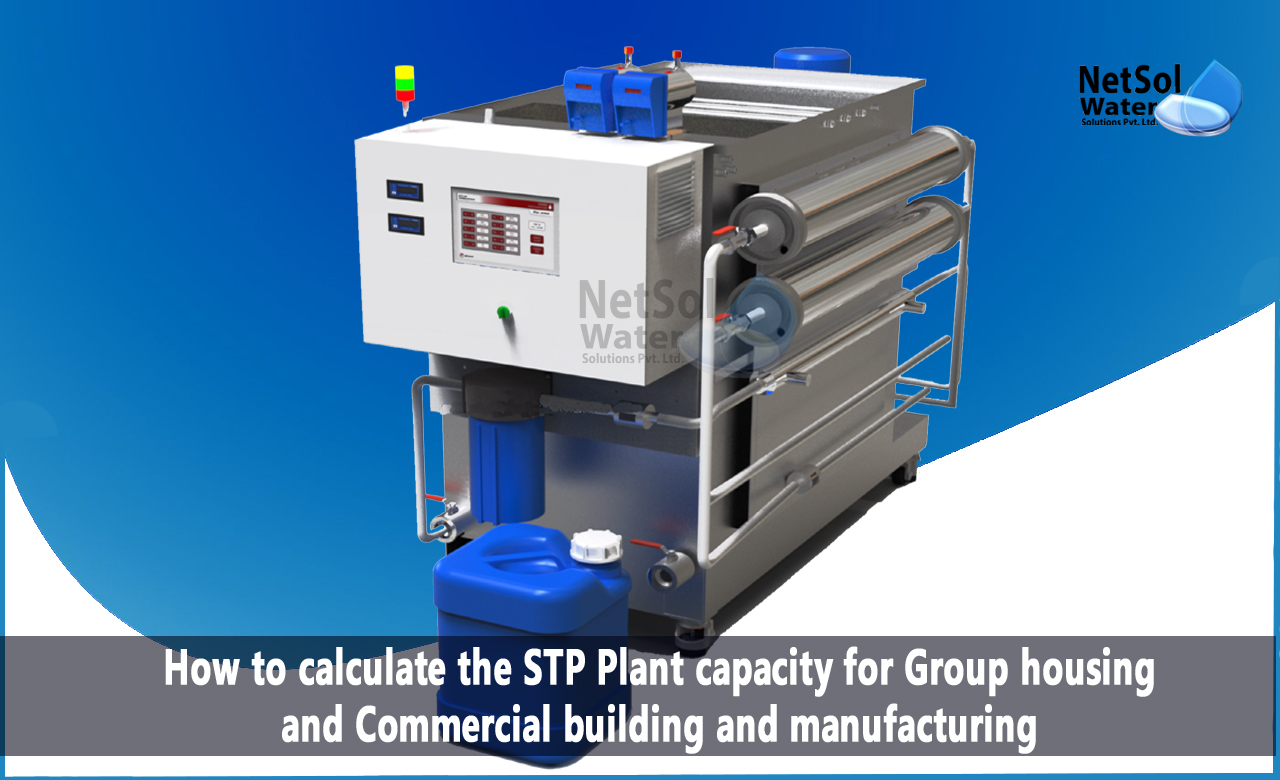How to calculate the Sewage Treatment Plant capacity for Commercial?
Sewage Treatment Plants (STPs) are an essential component of modern-day urban and industrial infrastructure. STPs play a crucial role in treating the wastewater generated by group housing societies, commercial buildings, and manufacturing units.
Here we will discuss how to calculate the sewage treatment plant capacity for group housing societies, commercial buildings, and manufacturing units.
STP for Group Housing Society.
For group housing societies, the per user requirement depends on several factors, such as:
• The number of residents,
• Water usage, and
• Flow rate.
According to S.K. Garg's book "Water Supply Engineering," the per capita sewage generation for residential areas is 80-150 liters per day. On the other hand, according to Metcalf and Eddy's "Wastewater Engineering," the per capita sewage generation for residential areas is 120-200 liters per day. The Central Public Health and Environmental Engineering Organization (CPHEEO) recommends a per capita sewage generation of 135 litres per day for residential areas. While according to the guidelines of the Central Pollution Control Board (CPCB), the minimum sewage generation per capita per day for a group housing society is 150 liters.
Let's assume a group housing society has 100 apartments, and each apartment has four residents. The total number of residents in the society will be 400. Assuming an average per capita water consumption of 150 liters per day,
The total water consumed = 100 x 4 x 150 = 60000 liters per day.
The total sewage generated by the society will be 80% of total water consumed:
The total sewage generated (@120 Lpcpd) = 0.8 x 60,000 liters per day = 48,000 liters per day.
To select the right capacity sewage treatment plant for this society, we need to consider the peak flow rate as well. The peak flow rate is the maximum flow rate of wastewater during a day. It usually occurs in the morning and evening when people use water for activities like bathing, washing clothes, etc. Let us take peak flow rate as 1.2 times the average flow rate. So, the peak flow rate for our group housing society will be:
Peak flow rate = 1.2 x 48,000 liters per day = 57,600 liters per day
Hence, the sewage treatment plant's capacity for this group housing society should be at least 57600 liters per day, considering the average flow rate.
However, to handle the peak flow rate, the capacity of the sewage treatment plant should be higher. We can choose a capacity of 576000 liters per day or higher to handle the peak flow rate.
STP capacity for commercial buildings and manufacturing units.
To calculate the STP capacity for commercial buildings and manufacturing units, we need to consider the following parameters:
• Type of industry: The type of industry determines the type and quantity of pollutants present in the wastewater. For example, the wastewater generated by a textile industry would contain high levels of dyes and chemicals, while the wastewater generated by a food processing industry would contain high levels of organic matter.
• Quantity of wastewater: The quantity of wastewater generated depends on the type and size of the industry. The wastewater generation can be calculated based on the water consumption per unit of product or the water consumption per employee.
• Pollutant load: The pollutant load in the wastewater can be determined by analyzing the wastewater quality parameters such as Biological Oxygen Demand (BOD), Chemical Oxygen Demand (COD), Total Suspended Solids (TSS), and Total Dissolved Solids (TDS).
• STP capacity: The STP capacity should be designed based on the maximum pollutant load in the wastewater. The capacity should be able to handle the peak load without compromising the treatment efficiency.
STP for Commercial Building and Manufacturing Unit:
For commercial buildings and manufacturing units, the per user requirement depends on the nature of the business, the number of employees, and the type of wastewater generated. According to Metcalf and Eddy's "Wastewater Engineering," the per capita sewage generation for commercial and industrial areas ranges from 25-500 liters per day, depending on the type of industry.
An Example:
Let's assume a commercial building has 200 employees, and each employee generates 50 liters of wastewater per day.
The total wastewater generated by the building will be 10,000 liters per day (200 employees x 50 liters per day).
Assuming a peak flow rate of 1.2 times the average flow rate, the peak flow rate for this building will be:
Peak flow rate = 1.2 x 10,000 liters per day = 12,000 liters per day
Hence, the sewage treatment plant's capacity for this commercial building should be at least 10,000 liters per day, considering the average flow rate. However, to handle the peak flow rate, the capacity of the sewage treatment plant should be higher. We can choose a capacity of 15,000 liters per day or higher to handle the peak flow rate.
Summary:
So as to summarize, the capacity of a sewage treatment plant depends on several parameters such as the number of occupants, water consumption per capita, type of industry, quantity of wastewater, and pollutant load. The STP capacity should be designed based on the maximum wastewater generation and pollutant load to ensure efficient treatment. The guidelines provided by the CPCB can be used as a reference to calculate the STP capacity for group housing societies, commercial buildings, and manufacturing units.
Leading manufacturer of sewage treatment plants in India.
Netsol Water is the leading manufacturer, supplier, and exporter of a quality selection of water treatment, and wastewater treatment products in India, by using advanced sewage treatment methods.
RO plants, water softeners, ETPs, STPs, DM plants, AMC, O&M, Ultra filtration, UV, Ozonation, ZLD plants, Anoxic tanks, and other goods and services are available from us. We also provide services to businesses in sectors including automotive, pharmaceutical, textile, pulp & paper, beverages, refineries, schools, hospitals, office buildings, and hotels, among others.
Call us at +91 9650608473 or email at enquiry@netsolwater.com for further information.



